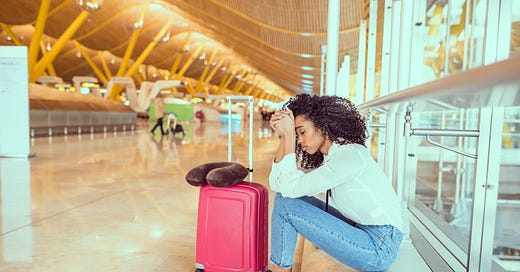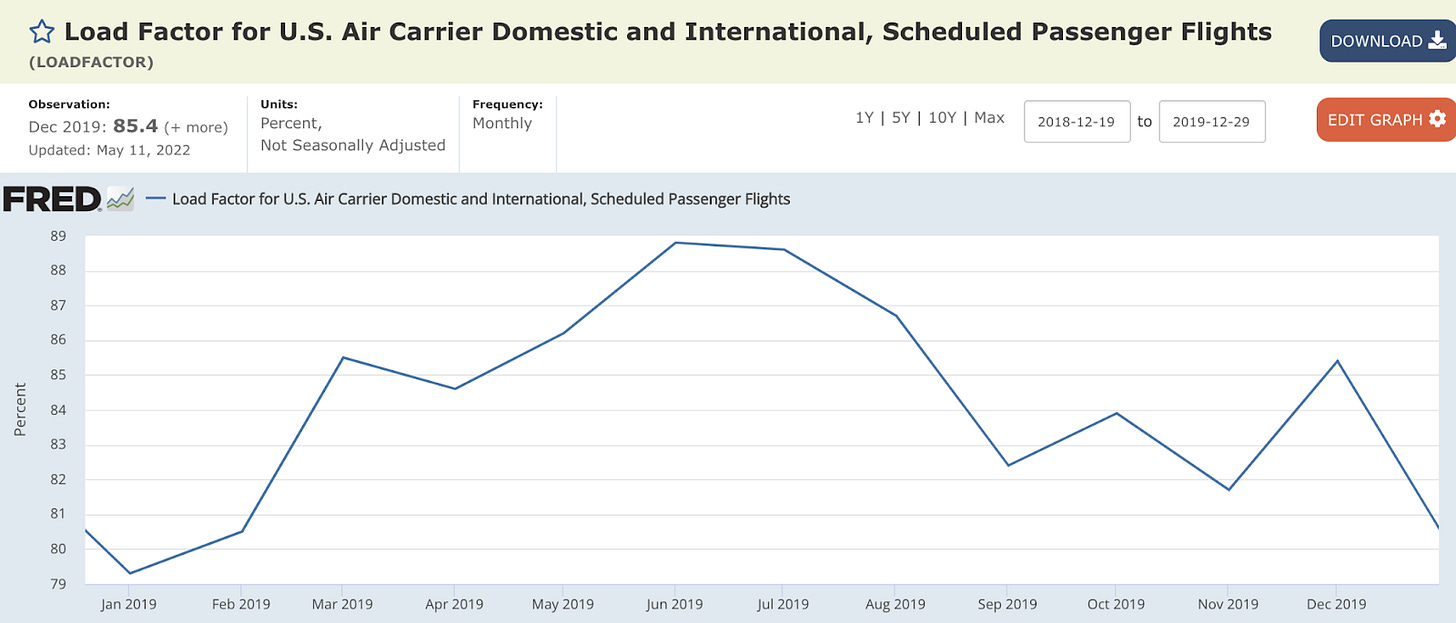A few weeks ago, Delta announced that it would be reducing about 100 flights a day between July 1 and August 7. In the email to its employees, the airline noted that these preemptive cancellations will be used to “build additional resilience in our system and improve operational reliability for our customers and employees… relieve pressure by proactively thinning the schedule.”
Air travel disruptions are not new, and COVID has only made things worse. I have already written about this topic before the winter travel season, and while many of the comments on Twitter painted me as an alarmist (which I can’t really deny being), and as much as I hate being right about these things, airlines did suffer major disruptions.
What are the main causes?
Primarily staff shortage, and more specifically, pilots:
“In 2021, the Federal Aviation Administration (FAA) issued 4,928 Airline Transport Pilot certificates, less than half the estimated number of pilots that the industry is looking to hire in 2022. To address this issue, US carriers have taken several initiatives.”
Airlines are suggesting various ways to alleviate this shortage. For example, Delta ended the requirement for pilots to have a separate four-year college degree (which seems like a reasonable thing to do). Republic Airways on the other hand, asked the FAA for permission to hire pilots when they reach 750 flight hours, instead of the required 1,500 hours, shortening their training period (which doesn’t seem very reasonable at all).
Most of these issues will persist for a while (and in fact, the pilot shortage was predicted even before COVID), so why is Delta preemptively canceling flights?
To better understand the logic behind this action, we need to first understand summer travel and the main trade-offs associated with such a decision.
Summer Travel: Avoid it at All Costs
Summer is the worst time to travel.
“Change my mind”
And if you don’t believe me, below are the statistics from 2021 (which are very similar to previous years) for “On-time percentage.”
Of course, it’s such a terrible time to travel because everyone else is traveling too.
And since more people are flying, the number of flights also increases:
But ultimately, it is the load factor, which is the percentage of seats that are sold on each flight, that peaks during the summer:
This data is from 2019 (before COVID), but it’s quite similar to other years (including 2021).
As planes are fuller, a delay in a single flight affects all other flights. For example, lines in security are longer, so more people will arrive late at their departure gate. Knowing that other flights are full, the airline is more likely to wait for these passengers (as the opposite would require them to unload their checked-in luggage, which takes an equally long time). More passengers also means longer boarding times, and more carry-on luggage that need to be gate-checked, causing even more delays. And since all flights are connected through a network of hubs and spokes, it becomes a domino effect.
Finally, note that the capacity of most airports is fixed, so as more flights are added, the utilization of gates and runways increases. This results in longer delays, where disruptions in even one flight will cause even longer delays for that, as well as other flights departing from the same airport.
Why?
Because of the notion of statistical fluctuations and dependent events. As flights are fuller and more flights are flown, even small fluctuations (in this case, minor delays) are amplified since there is no slack capacity to absorb them. Imagine the day's first flight being delayed because some passengers were late to arrive at the gate. Every flight of this plane, or any connecting flight that these passengers are supposed to take, will also be delayed. If the utilization of the airport is low or flights are half empty, these fluctuations are easily absorbed throughout the day. But when everything is highly utilized, this is not the case.
On top of that, over the summer, while the weather is generally better than in winter, it’s still quite unpredictable, resulting in more minute-delays due to possible bad weather.
Looking at the graph, July is the worst month, February comes second, and June and May follow close behind. So summer months are just not a great time for travel.
What’s new this Summer?
The pilot shortage has been with us for quite some time and may take a long time to be resolved, so what’s new this summer?
The new factors are the shortage of airport employees, and the strikes caused by the existing employees who are exhausted at this stage.
Last week, Dutch Airlines KLM stopped selling tickets for four days following the chaos at its hub, Schiphol.
The delays were caused by airport employees that were on strike, protesting against low wages, and it was not a pretty picture:
The low wages are making airport jobs even less appealing.
“‘Something needs to be done,’ unions say, both passengers and staffers are literally falling over due to exhaustion from the ongoing disruptions and delays. The worst is yet to come as the Summer is coming rapidly and the airport says that the problem takes time to solve.”
You are not only locked into a low-paying job, you are being overworked and you also have meeting the delightful sight of several angry passengers to look forward to. Where do I sign up?
Preemptive Cancellation
So under these circumstances, and the already high load factor of the summer, the question is: Why is Delta, as well as other airlines (maybe a little less extreme), moving forward with these preemptive cancellations?
What’s the trade-off?
As previously mentioned, some elements are pretty certain:
More demand, and potentially even more passengers this summer due to revenge travel (which apparently is a post-COVID thing).
Less supply, even though we see fewer resignations as the economy is entering a recession and employees start questioning their decisions to resign at mass.
But there is additional pressure this summer as the weather is uncertain and unpredictable. Some summers are bad while others are ok. When the airlines make a decision in May to cancel flights in July, they don’t exactly know what the weather will be like. The strikes we saw in Amsterdam may be the beginning of a wave, or may just be one occurrence. It’s hard to know about July when you are making decisions in May.
What’s the advantage of canceling flights in advance (rather than waiting until something occurs and canceling then)?
Canceling in advance means the airline will either rebook the passengers who planned to be on those flights on its existing capacity, or lose some of them to competing airlines.
If the weather is indeed bad, they are ahead of other airlines. Last-minute cancellations are the worse because finding a slot for all the passengers that are now stranded is a nearly impossible task. The long lines in front of the poor customer service agents are all too familiar.
But if the weather is not all that bad, if airport strikes are less common, absenteeism is back to pre-COVID levels, and the airline has canceled flights in advance, they will either lose customers to competing airlines, or their flights will have a much higher load factor. Because higher load factors lead to more delays, in this case, Delta is in a bind: it will either lose customers or it will experience significantly more delays.
When the load factor (which is already increased during summer) is increased further, the capacity an airline has to accomodate any disruptions, diminishes. So by canceling flights, Delta may in fact, create less resilience.
As usual, no optimal answers, only trade-offs.
But why is Delta bolder than other airlines? I will argue that it has to be because Delta has 13,000 pilots, while United Airlines has 12,200, and 251,140 Available Seat Miles (ASM), while United has 253,255 ASMs (ASM is a measure of the “capacity” of the airlines).
If we assume that the shortage impacts both airlines the same way, Delta will be affected disproportionately by the shortage. If we look at the ratio of ASM per pilot, United pilots are more “effiicient.” If there aren’t enough pilots, you cannot staff the flight, and hence you have to cancel it, and you need to cancel in advance to allow the system to accommodate the passengers who are almost sure to be stranded.
But this is definitely not about resilience. In fact, with a higher load factor that is only becoming higher, we should expect an explosive summer. Fuller flights with more angry customers, and longer delays at airports.
What can we do?
Here are some suggestions:
-Choose direct flights.
-Arrive early at the airport.
-Fly only with a carry-on luggage so you can hop between flights, and
-Bring lots of reading material.
This summer, you may end up spending more time at the airport than you were initially planning for.









Also, flying earlier in the day is more preferable to later in the day since your plane and crew are subject to fewer upstream dependencies.